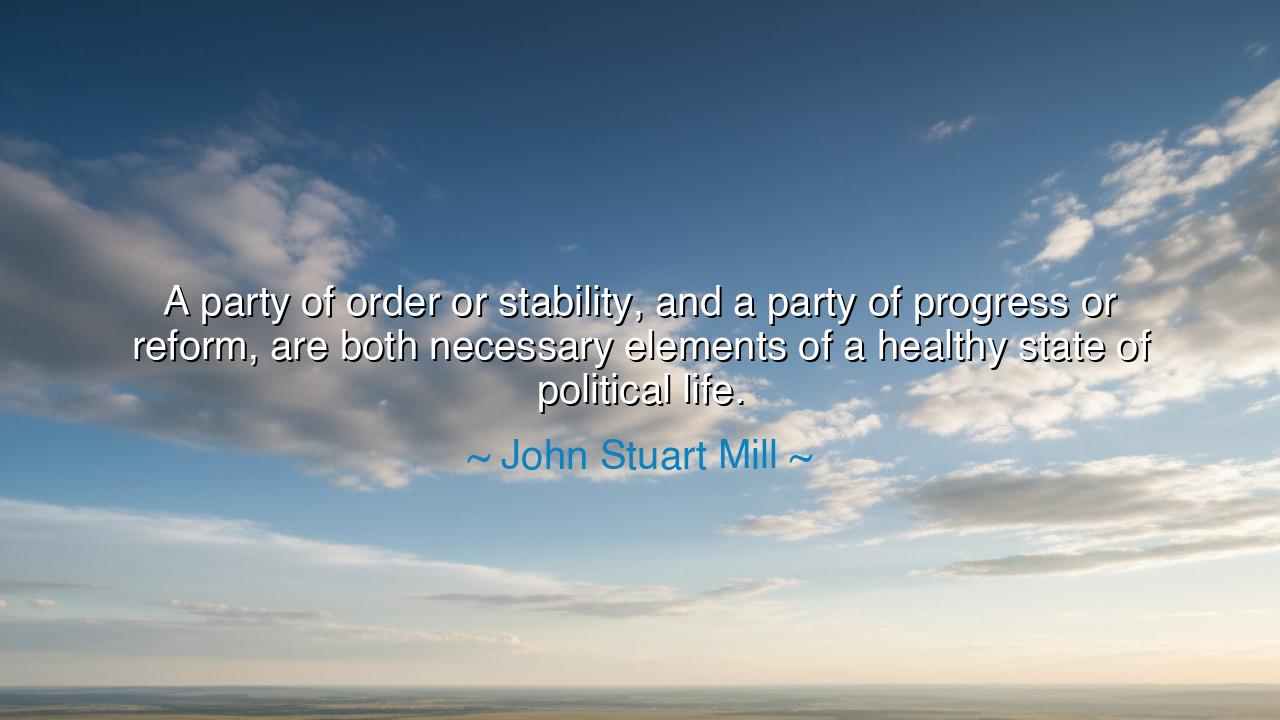
A party of order or stability, and a party of progress or
A party of order or stability, and a party of progress or reform, are both necessary elements of a healthy state of political life.






The words of John Stuart Mill — “A party of order or stability, and a party of progress or reform, are both necessary elements of a healthy state of political life.” — resound like the measured wisdom of an ancient philosopher. They remind us that the life of a nation is a living balance, a dance between preservation and transformation. Without order, the state collapses into chaos; without progress, it withers into stagnation. Thus Mill teaches that both forces, though often opposed, are in truth companions in the eternal work of building a just society.
The meaning is profound: stability anchors a people, preserving traditions, institutions, and values that give them identity. Yet without the counterweight of reform, these same traditions can harden into tyranny, and those institutions meant to protect may begin to oppress. Likewise, progress breathes renewal, opening the path to freedom and justice, but without order, unchecked change can dissolve into destruction. The tension between the two is not a curse, but a blessing, for it forces a nation to move forward without forgetting its roots.
History itself bears witness to this truth. In the founding of the United States, there were those like Alexander Hamilton who prized order, strong institutions, and centralized authority, and those like Thomas Jefferson who cried out for progress and liberty for the common man. Their visions clashed, but from their rivalry was born a durable political life, one that allowed both tradition and innovation to coexist. Had either voice triumphed alone, the republic may have fallen into despotism on one hand or anarchy on the other.
So too in other lands: in Britain, the long interplay between Conservatives and Liberals, guardians of tradition and champions of change, forged a society that advanced while retaining its character. Abolition of slavery, expansion of suffrage, and protection of institutions all came not from one spirit alone, but from the friction and fusion of order and reform. Mill himself, a Liberal philosopher, understood that even reformers need the restraint of those who defend stability, just as conservatives need the fire of progressives to prevent decay.
Let this lesson be carried to generations yet unborn: do not despise the tension between order and progress, for in their contest lies the strength of nations. A tree must have deep roots to withstand storms, yet it must also grow new branches to reach the light. So it is with political life: the guardians of tradition and the heralds of change must contend, and through their contention, the people find the path of wisdom. Mill’s words, like a compass, point us to the truth that a healthy state is not one-sided, but whole.






CVChinh Vu
John Stuart Mill’s words really stand out because they remind us that politics is about finding a balance between different forces. Stability and progress might seem like opposing forces, but both are essential for a healthy society. How do we ensure that progress doesn’t become chaotic or too radical, while maintaining enough flexibility to adapt to changing circumstances? Can we have both in a world that often seems to lean too heavily on either one?
NHNgoc Hien
This quote makes me reflect on how societies evolve over time. It seems like change is often met with resistance, particularly from those who prioritize stability, but without progress, we risk stagnation. How do we maintain a balance between the need for societal stability and the desire for innovation and reform? Can political systems today manage this balance, or does the political climate tend to favor one side too much over the other?
MPHuynh Mai Phuong
Mill’s quote highlights the importance of both continuity and change in political life. Is it possible for a political system to function effectively if it only favors one side—either order or reform—at the expense of the other? I think Mill is right to say both are necessary, but in practice, how can political systems ensure that one doesn't overshadow the other? Can you have stability without stifling progress, or is reform always disruptive?
UGUser Google
John Stuart Mill’s perspective on the balance between order and progress makes me think about the tension that often exists in politics between maintaining stability and pushing for reform. It seems like a healthy society needs both elements—order to prevent chaos, and progress to foster growth and adaptation. But how do we strike the right balance? Can one party lean too much toward stability, while the other moves too quickly toward reform? How do we keep these forces in equilibrium?